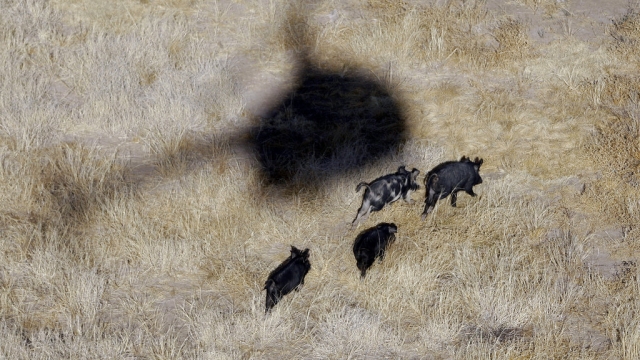Feral hogs have overrun nearly the entire state of Texas, causing hundreds of millions of dollars in damage annually in spite of widespread attempts to eradicate them, including traps, contraceptives, and hunting.
Will Reneau is a fourth generation rice farmer in the state and grows long and medium grain rice on 1,900 acres. He says feral hogs plodding through his paddies is impacting the bottom line of his business.
"I started in 2008 and my number one issue is feral hog damage," he told Scripps News. "Our number one problem causer."
Reneau's rice grows in standing water, and because pigs don't sweat, they seek out places like this to cool off from the summer heat.
SEE MORE: Sustainable farming: How technology can optimize food production
The Texas Parks and Wildlife Department says the pernicious wild pigs have spread and can be found in every single county of Texas except El Paso. But it's not just farms that are feeling the impact. Feral hogs have also been spotted around golf courses, suburban subdivisions, and even cemeteries.
Researchers at Texas A&M University say a conservative estimate for the number of feral hogs in the state is 3 million to 4 million.
"Feral Hogs were introduced to the Americas from the explorers," said Jamie Sugg with the Texas A&M Agrilife Extension. "They brought them over here as a food source ... seems like lately they've really exploded."
And it's that explosion of feral hogs that has people like Reneau going to war.
SEE MORE: Data shows more farmers are trading in tractors for drones
In Texas you don't need a permit to hunt wild hogs — just the farmer's permission. Hunters also trap feral hogs around the state and have found a market for them.
"What I'll call the upscale operators — those that operate at a high level — such as retailers in Europe, they prefer U.S. wild boar because of all the food safety features," said Pat McGowan, vice president at Broadleaf Game. "We test animals for trichinosis. We test animals for salmonella. We test animals for e-coli. We have all the same criteria as if we were processing a domestic pig."
However, even with no restrictions on hunting, trapping, or contraception to prevent breeding, the plurality of pigs on the pastures is proof that humans can't control everything in nature.
Trending stories at Scrippsnews.com



